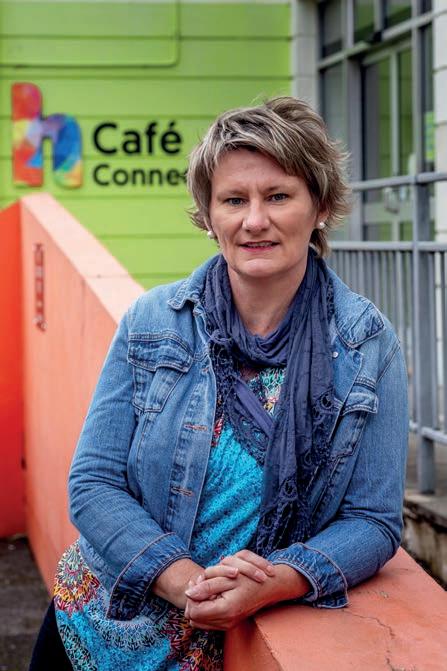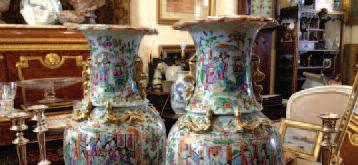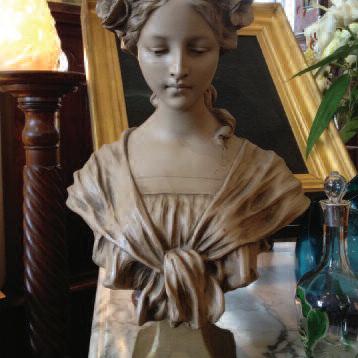
8 minute read
Closing the loop with
Closing the loop with compostable packaging
By Caroline Spencer
Advertisement
We may have all got behind the cause to reuse plastic bags in the supermarket but Karen Gray wants us to go further. She wants to replace all bags, takeaway containers and cutlery with compostable alternatives.
Karen’s inspiration goes back to childhood. Growing up in Durban in South Africa, she saw how her father, disabled by polio as a child, could make money from waste. “ I started to research
‘Every Saturday he would buy at auctions, fix things and re-sell them,’ she said. ‘Making something out of a waste product was enough to keep our family safe and healthy and to send us to school. And he used to collect waste from mushroom farms and make it into compost. I didn’t know what it was called then but I now know it as ‘closing the loop.
Unlike the traditional linear economic model of ‘take-make-consumer-throw away’, a circular ‘closed loop’ economy is where products get collected, repurposed and re-used. A compostable closed loop would see compostable bags and containers combined with food waste and other green waste being made into compost, put back onto the soil, adding nutrients to grow more crops. More recently, Karen was becoming increasingly aware of the world’s problem with plastic pollution and was moved to take action after watching Blue Planet.
‘I started to research alternative products that are earth friendly and found products made from plants, from regular crops such as corn and sugar cane that are renewable and lowcarbon. I collected samples from across the world,’ she said.
In 2018 Karen founded Green on Purpose, a company established to market eco-friendly plant-based products and she became a distributor for a UK company called Vegware. She has since sourced packaging made from mushrooms, algae, cassava, sugar cane and bamboo.
One success has been with Café Connect at Highlands College, where the students’ canteen has moved over to plant-based packaging, replacing 270,000 single-use plastic takeaway containers over 12 months.
Head chef Patrick Hogge said he had taken action because he wants to do his bit for the planet for the next generation. ‘When I’m not at work or with my family, I am out foraging and seeing what I can get off the land. I have three daughters, the youngest of whom is seven weeks, and I’d like something to be left for them.’ The trouble, however, is that none of the packaging waste from the canteen is actually being composted. ‘It needs to be on a larger scale to achieve,’ he said. ‘We need all cafés to do the same.’
‘Although the Government of Jersey is prioritising the environment, we are still unfortunately unable to compost the packaging locally. On the plus side, when this packaging is burned fewer toxins are released - there’s no plastic, no carcinogens - and you feel a bit better that anything that doesn't make it to the bin will break down reasonably quickly. ‘I like to think we are sowing the seeds for a better future for the next generation. Clearly it would be so much better if the packaging could be composted properly, but we have to start somewhere.’
“I like to think we
Karen hopes that in 2021 the canteen can start closing the loop. This means that their containers should start to be returned to compost.
‘The whole idea is that we set up collection points where people can return the compostable bags, and then link in with Glyn Mitchell from The Carbon Farm for composting.
‘I have found a manufacturer of compostable shopping bags, bags for life, bin bags, even dog poo bags. What I would like to do is make jute bags locally. They are eco friendly and sustainable, and better than cotton, because they are grown chemical free. Jute grows quickly and has lower impact on the environment and uses less water than cotton. And if they are made in Jersey, the aim is to make them affordable to start replacing plastic bags. ‘We need one or two big retailers to make this happen. Jute bags could attract funding as we can put branding on them.
‘For 2021 my vision is to have at least one closed loop programme set up - with collection services of compostable items, processing and a commercial composting site that’s fully operational. The aim is for one in each parish but we need to get the pilot done next year. ‘I am also planning online workshops and awareness events, as education is vital.
‘This is already happening in the world. We just need to build up confidence and know that it can actually happen in Jersey. I focus on compostable bags to start, but this is moving toward all packaging becoming compostable, it’s the future to reduce plastic pollution and save our planet. We can close the loop, we can do it in Jersey, and it will create jobs, be sustainable, and add to our food security.
‘Three years I have been going at this, and I will keep going until people join me on this journey. Demand for more eco-friendly products is now been driven by consumers as well. Write to your Constable. Ask cafés what packaging they are using. Start using your voice. We are all in this together.’ “ Three years I have
Beyond our ‘wildest’ dreams?

Could Jersey invest in a local rewilding project? Asks Mike Stentiford
Aword that has now surreptitiously crept into the realms of environmental jargon is that of rewilding, nine letters that generally conjure up images of alpha wildlife species in big, wide open spaces.
It was a subject enthusiastically explored in fine detail during a recent presentation by Rob Stoneman, a special guest of The National Trust for Jersey.
As an active adviser to the Netherlands based Rewilding Europe Project, ‘no wolf was left unloved’ during his wide analysis of what is becoming a highly visionary subject.
According to Rob Stoneman, many countries throughout Europe are already embracing rewilding initiatives with funding secured from the EU and proactive support and encouragement arriving from individual government agencies.
While large tracts of open landscape in Europe are taking not quite the lion’s share - more so the lynx’s share - of rewilding success, selected parts of Britain are choosing not to be left behind. Two of the most well established UK projects are proving highly successful, although both are quite different in content. While the 23,000 acre Alladale Highland Estate in Scotland concentrate all efforts on reintroducing wolves and bears, the more modest 3,500 acre Knepp Estate in Sussex has lowered its sights a little by offering a much needed helping hand to more familiar but no less vulnerable species.
The rationale here is devoted to freeroaming herds of cattle, horses, pigs and deer that are collectively proving the drivers of new habitat creation.
While neither species can be regarded as having anything remotely to do with ‘wild rewilding’, the habitats they are creating have led to the successful return of such Red Data Book species as long-eared owls, ravens and lesserspotted woodpeckers.
Even more important is that the estate, now known as Knepp Wildland, is providing a much needed home base for extremely rare turtle doves and purple emperor butterflies. Further proof of successful habitat creation is that the estate now boasts 2% of the UK’s entire breeding population of nightingales.
The obvious success of Knepp Wildland begs the question as to whether any similarly modest rewilding projects might be worthy of environmental support here in the Island? We can certainly delete any unrealistic thoughts of bison, bears or wolves, but perhaps by thinking outside the box and restoring carefully selected and largely neglected landscape for the benefit of a declining biodiversity, then who knows what might be achieved? One particular environmental ‘first step’ aspiration towards a local rewilding project would be to improve specific tracts of open grassland at La Mielle de Morville towards the north end of St Ouen’s Bay.
This is a large open area of scrub and scattered treeline that is perfectly placed for some visionary conservation improvement.
Adding impetus to this particular concept of ‘biodiversity wellbeing’ is that this publicly accessible tract of land sits comfortably within the western fringe of the Jersey National Park.
As ‘environmental innovation and nature conservation’ are official commitments within the Park’s designation, there seems no better way of both exploring and implementing the prospect of rewilding.
It’s well known that Jersey’s once natural habitats are falling under increasing pressure from human activity, an increasing population and island-wide building development.
While there’s an increasing understanding of wildlife gardening and of urban ‘rewilding’ elsewhere in the world, Jersey now has a prime opportunity of some visionary environmental rewilding of its own.
DEALERS IN FINE ANTIQUES, WORKS OF ART, JEWELLERY AND OBJECTS

We are the Channel Islands’ leading purchaser of antiques, jewellery and effects. These, together with my extensive experience and knowledge enable us to offer the most comprehensive service in the Islands, whether buying or selling.



La Grande Route De St Laurent • Jersey • JE3 1NJ Tel: 01534 485177 • www.stephencohuantiques.com Open Wednesday to Saturday 10am - 5pm. Anytime by appointment. Resident on premises.











